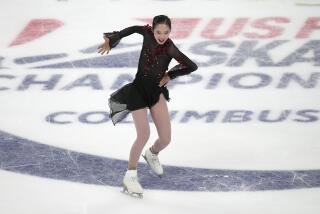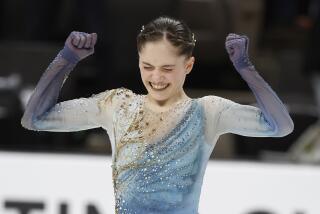Kwan Given Lesson in Style and Substance : Figure skating: Torrance 13-year-old finishes second in pro-am to more experienced, graceful Kadavy.
- Share via
Youth was served notice Friday night at the Sports Arena. Although Michelle Kwan of Torrance was rewarded for the extraordinary things she can do at the precocious age of 13, judges in the Hershey’s Kisses Pro-Am also sent her a message about what she must do in order to continue her journey toward the top of the women’s figure skating world.
Despite the superior technical merit scores Kwan, of Torrance, earned for her four-minute freestyle program, in which she landed six of the seven triple jumps she planned, she had to settle for the $30,000 second prize.
Perhaps more valuable to her in the long run were the lessons she had an opportunity to learn in competing against the more mature, more graceful professionals, Caryn Kadavy and Rosalynn Sumners.
Both won over the crowd of 10,737 with their elegant presentations. Kadavy, the 1988 Olympian who finished first last year by upsetting Nancy Kerrigan, defended her title to win $40,000, and Sumners, the 1984 Olympic silver medalist, was third to win $25,000.
Kadavy, who is skating with more confidence than ever, received scores of 5.9 on a scale of 6.0 for composition and style from seven of nine judges. Sumners’ style marks included two 5.9s and five 5.8s.
Of course, neither Kadavy, 26, nor Sumners, 29, even in the prime of their careers, could jump like Kwan, who made only a few minor errors and earned 5.9s from eight judges for technical merit.
However, she was marked down for her artistic deficiencies, which might be something that she cannot correct at this stage. There is only so much a 13-year-old can do to project mature femininity.
Her coach, Frank Carroll, thought she should have won, pointing out that Kwan took more risks than Kadavy, who tried only one triple jump. That was one more than Sumners tried.
“But I’m not unhappy,” he said. “Caryn is a beautiful skater, and this makes it easier for me to point out things that she does to Michelle and say, ‘Have you learned from it?’ ”
Kadavy, who was still a novice when she was Kwan’s age, predicted great things for her.
“She is our future,” Kadavy said. “She’s very mature for her age, but she still has time to mature more. That will come with age.”
Perhaps the same thing can be said for the pro-am concept, which was introduced to the sport only last year and is suffering growing pains. Hoping to salvage box-office receipts after Kerrigan withdrew, the USFSA did not rush to get out the information after Brian Boitano and Scott Hamilton joined her. Some fans were visibly disappointed to find out about it when they arrived.
Still, there were more pluses than minuses in this year’s event, due not only to the quality of the skating but also to the ambience created by the crowds. Perhaps it is the influence of an interactive generation, but the spectators were not shy about letting the judges know what they thought about the scoring.
They were particularly vocal about Paul Wylie’s low technical marks Thursday night, even though the judges had little choice but to mark him down after he failed to complete a required element.
His fans could have relaxed, because his presentation scores, including two 6.0s, ultimately placed him where he should have been, in first place entering Friday night’s freestyle programs. His style marks in that program earned six 6.0s as he easily won.
Reigning national champions faltered in dance, in which Elizabeth Punsalan and Jerrod Swallow finished second to Renee Roca and Gorsha Sur. But the pairs national champions, Jenni Meno and Todd Sand of Costa Mesa, rebounded from a disappointing technical program to win.
More to Read
Go beyond the scoreboard
Get the latest on L.A.'s teams in the daily Sports Report newsletter.
You may occasionally receive promotional content from the Los Angeles Times.






